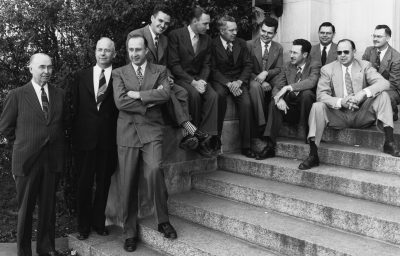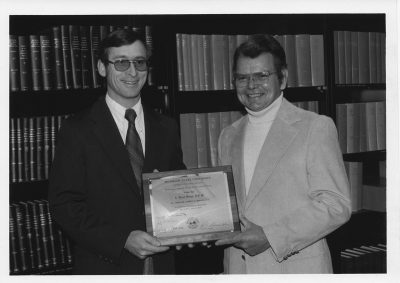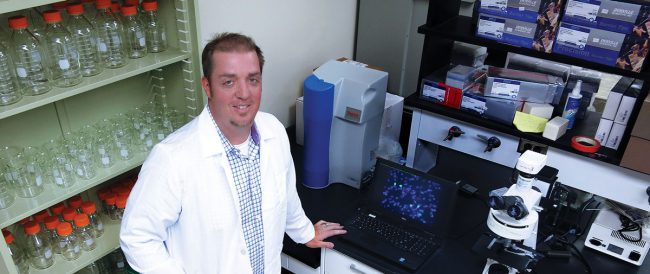 Read More
Read More
by Dr. Janver Krehbiel
Since its founding more than 100 years ago, the College of Veterinary Medicine at Michigan State University has benefited from great leadership and has been richly blessed with bright and dedicated faculty. Among those exceptional educators is Dr. Robert Schirmer, Sr.
Dr. Schirmer was a long-time faculty member in the Department of Small Animal Clinical Sciences and chair of the department from 1979 to 1987. The appreciation of his outstanding academic skills and the excellence of his teaching were recognized by the college, in awarding him the Distinguished Faculty Award in 1990.
Dr. Schirmer was born January 24, 1925 in Dansville, New York, attended Cornell University and received his DVM degree in 1946. After graduation, he served as an instructor of small animal sciences for one year at Cornell and then came to Michigan State University. From 1950 to 1987 he managed the Small Animal Medicine Clinic in the Veterinary Medical Center and taught most of the subspecialties that we have today. He was a leader in the development of thousands of veterinary students and hundreds of residents and graduate students.
He was deeply committed to the education of future veterinarians and to the continuing education of practicing veterinarians. This dedication to young students was reflected in the establishment of the Robert G. Schirmer Post-Doctoral Fellowship to support students in either Large or Small Animal Clinical Sciences.
A clinician’s clinician
Dr. Schirmer was a “clinicians’ clinician” and an amazing diagnostician. Before digital imaging techniques like computed tomography and magnetic resonance imaging, echocardiogram, and even ultrasound scanning, he used physical senses and hands-on experience to accurately diagnosis animals and implement appropriate therapy.
He was an excellent surgeon and published numerous papers on surgical techniques and internal medicine problems in dogs and cats. He was highly respected nationally and was a charter member of the American College of Veterinary Internal Medicine in 1973.
Introducing veterinary medical specialties
Along with Drs. Wade Brinker and Wally Keller, and the administrative support of Dean John Welser, Dr. Schirmer introduced veterinary medical specialties in the College of Veterinary Medicine at Michigan State University. These four leaders had a vision for the future of veterinary clinical education. Dr. Brinker provided leadership in orthopedic surgery, Dr. Keller in ophthalmology and soft tissue surgery, and Dr. Schirmer assisted in the other specialties. Dr. Schirmer provided the major push to make it happen.

In addition to those already mentioned we now have subspecialties in cardiology, dermatology, internal medicine, general medicine, neurology, theriogenology, and emergency medicine.
During the emergence of these “state-of-the-art” specialties, Dr. Schirmer delivered clinical science lectures, conducted and managed clinical education for the professional students, and mentored the young faculty in the new subspecialties. He readily transferred responsibility to new specialists and unselfishly supported new disciplines as they evolved.
A strong and compassionate leader and colleague
Dr. Schirmer provided strong, effective leadership prior to the existence of associate chairs. His only clerical support was provided by two secretaries, Coral Johnson and Shelia McMonigal. He rarely took vacations, with the exception of opening day of deer season.
He was a great advisor and counselor to students, staff, and faculty and would always find time to assist whenever and wherever. His mentorship was unselfish and focused on what was in the best interests of the person with whom he was talking. Dr. Schirmer had broad knowledge of the university and the profession and he truly cared about people and animals.

Dr. George Eyster, emeritus professor of Cardiology and the first new specialist that Dr. Schirmer brought to the college characterized Dr. Schirmer as follows: “Perhaps the great legacy of Bob Schirmer is the number of academic veterinarians that he taught, guided, nurtured, and advised. He found clinicians with interest in specialties, encouraged them and turned the specialties over to them. These clinicians populated not only CVM/MSU but numerous other veterinary medical schools and specialty practices.
It is a tribute to the man, that he unselfishly turned over these services to them. It also shows his love for MSU and the practice of veterinary medicine. His devotion to the Department of Small Animal Clinical Sciences was unrivaled. He brought a family atmosphere to the department and the comradery that marked our department was the envy of schools throughout the country.”
Dr. Richard Bennett, who completed an internship in the teaching hospital, joined the faculty in the mid-sixties. Dick shared the following experience about Dr. Schirmer. “As a young faculty member I took Bob a good bottle of Kentucky bourbon for Christmas. Bob was entertaining a house guest, and he invited me and Dr. Gupta to join him in sampling the gift His sweet wife, Lil, gave us dinner and the evening slipped away more quickly then we realized. I missed my plane to New Jersey for the holidays but it was a warm and rich celebration that I will never forget. I knew Bob as a boy growing up in Okemos and I have great memories of him – he was truly one of the greats.”

Dr. Krehbiel, in 45 years with the MSU College of Veterinary Medicine, served in capacities including senior associate dean for administration, associate dean for academic programs, acting dean, and director of the international program.








